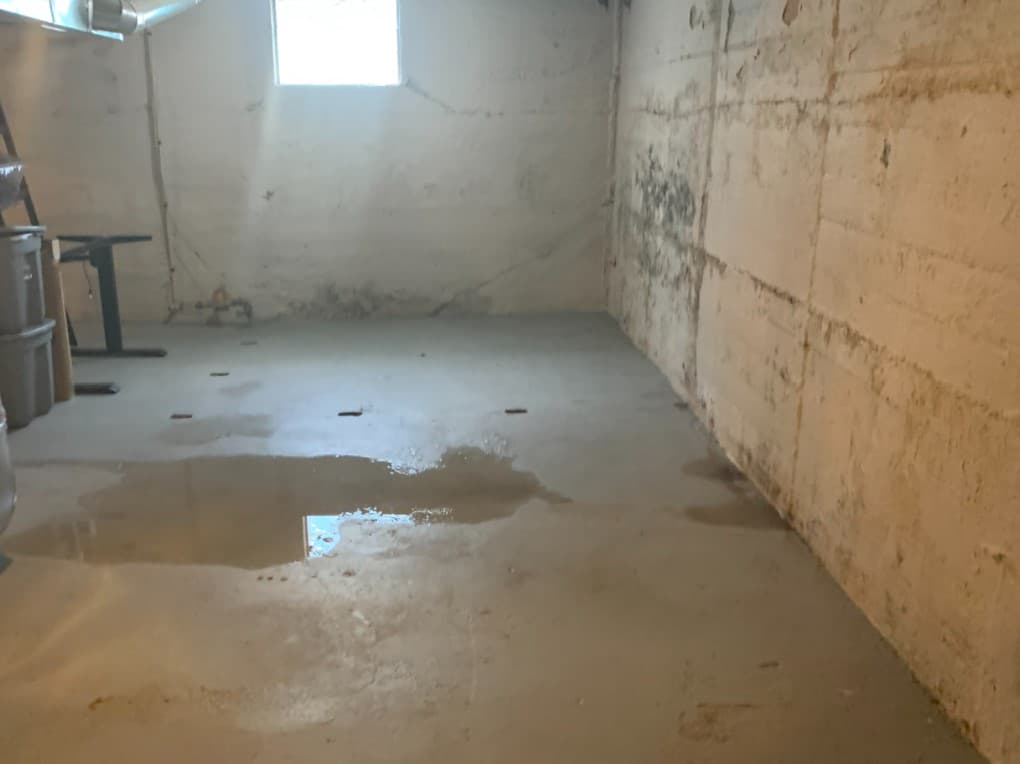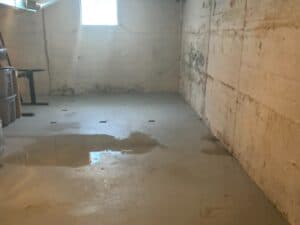
Originally posted 3/11/19, revised 8/25/21
When you find water in your basement, you’re probably annoyed. Frustrated. Fed up. It doesn’t matter if it’s the first time, the third time, or if it only happens during a heavy rain: water intrusion is bad for your foundation and should be resolved.
Acculevel has been repairing foundations and waterproofing homes since our start in 1996. Founded by Andy Beery, we’re a family-owned and operated company that has helped more than 30,000 homeowners restore strength, stability, and resale value to their homes.
There are many variables and potential problems with water intrusion. To help you sort through them, we’ve compiled a list of do’s and don’ts to follow when waterproofing your home.
Procrastination can cost you money. It’s important for you to have issues repaired promptly; small problems have easier and less expensive solutions. If you see something that indicates that water is affecting your foundation or basement walls, take action.
You may see thin, hairline cracks, water spots or efflorescence, a musty smell, or long horizontal cracks. All of these are common signs that indicate water damage. If you are unsure if something is a symptom, or you’re not certain what it means, look it up on our free Symptom Checker.
Scope around your basement or foundation, and try to identify the source of the water. This could make a big difference in which type of contractor or repair company you need. If it turns out to be a leaking pipe, or damaged water line, you’ll need a plumber right away. Once the water is stopped, then you’ll want to hire someone to fix the water damage.
If the water intrusion only happens during heavy rains, you may want to take pictures of the water intrusion. This can help a contractor track down the water source if you can’t find it, or if the water has dried up before your appointment.
Likewise, if the source of the water is covered by drywall or carpeting, you’ll need to remove those materials to allow diagnosis. This may seem like a messy inconvenience, but remember this is something you’ll have to do anyway. Materials like drywall and carpet will decay and grow mold if they get wet.

This photo was taken by an Acculevel project advisor during a free estimate appointment. Water is seeping in through the cove joint (where the wall & floor meet).
Please do not try to repair your foundation by yourself. This is the structure that supports your home. Improperly or incompletely done repairs can lead to serious problems that can threaten your home’s stability and longevity. For example, water drainage needs to be installed below the basement floor; this requires a jack hammer to break open the perimeter of your floor. An inexperienced contractor could damage the footer that supports your foundation, crack the walls, etc.
Another thing to consider is the type of repair materials. Most contractors have access to equipment and materials that normal consumers do not. Acculevel uses a flexible adhesive epoxy fill to repair foundation cracks. And that epoxy? Is not available in stores. It’s only sold to professional repair companies, directly from the manufacturer. The access is restricted because this product requires a professional level of installation.
While we urge you to not DIY your foundation or waterproofing, there are actions you can take to reduce water intrusion. One of these is snow removal. Here in Indiana (Acculevel is located in Rossville, IN), we get a fair amount of snow in the winter. Clearing it off your roof will prevent ice dams from forming. Ice dams trap water on the roof, limiting how quickly it melts and allowing it to drain next to your home’s foundation.
Likewise, it’s important to maintain your guttering and the grading around your yard. For more suggestions on how you can minimize water collection around your home, check out our blog on How to Waterproof Your Basement From the Outside.
When you meet with contractors, don’t let them pressure you into making a decision. Don’t hire a general contractor to work on your foundation; they’re excellent at general types of repairs, but your foundation is a specialty area. (You don’t go to your General Practitioner when you have a toothache, right?) And do not let yourself be swayed by pricing alone. Evaluate the overall value of the service you’re being provided, including warranty, maintenance costs, etc.
For additional help, use our checklist of Questions to Ask a Contractor. This list is the product of multiple brainstorming sessions, and includes insights from everyone on our team. We developed this list to help homeowners like you thoroughly evaluate service providers and choose the best fit for you.
Like our Questions to Ask checklist, we designed our basement waterproofing guide to be as comprehensive as possible. It’s a free resource available to all homeowners, and it tackles frequently asked questions about everything: why a basement leak, what types of drainage are available, why you might encapsulate a basement, what waterproofing costs, and more!
If you live in Indiana or the surrounding areas, call Acculevel 866-669-3349 or fill out our online form. We’ll schedule an appointment for you with one of our experienced project advisors. They will discuss your concerns, assess your home, and work with you to determine the whole-home solution that will meet your needs.
If you don’t live within our service area, we recommend asking friends or neighbors for reviews of the contractors they’ve worked with in the past. Please also make sure they are properly insured and accredited by the Better Business Bureau.
[DISPLAY_ULTIMATE_SOCIAL_ICONS]